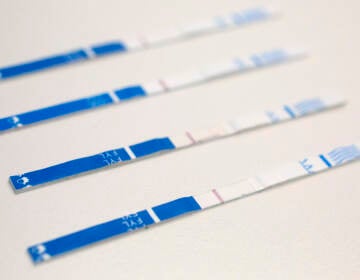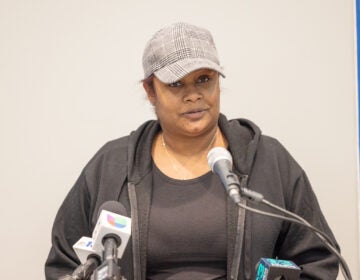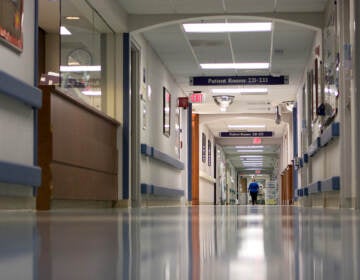Independence Blue Cross joins health insurers ending co-pays for naloxone
When the policy change takes effect March 1, many covered under its health insurance plans will be able to obtain the drug at no cost.

Paul Cherashore of the Philadelphia Overdose Prevention Initiative holds a dose of naloxone, an antidote for opioid overdoses. (Courtenay Harris Bond)
One of the Philadelphia region’s largest health insurers is eliminating co-payments for naloxone, the lifesaving medication that can reverse an opioid overdose.
When Independence Blue Cross ends the charges March 1, many people covered under its health insurance plans will be able to obtain the drug at no cost.
The new policy, which removes a financial barrier for those who need the lifesaving drug, is a response to the increasing number of fatal overdoses brought on by the opioid epidemic, said Rich Snyder, chief medical officer.
“We know we’re going to have overdoses,” Snyder said. “You need the naloxone to reverse them. And we just don’t want to have financial barriers in place.”
The co-pays to be eliminated run from roughly $10 for generic naloxone to $50 for name-brand Narcan, said an Independence Blue Cross representative.
Other insurance companies have also adopted policies doing away with co-pays for naloxone. Aetna stopped charging them at the beginning of the year, and Amerihealth New Jersey will put its policy into effect next month.
In Pennsylvania, anyone can get naloxone without a prescription under a “standing order” from the state physician general. New Jersey and Delaware also have laws that make it available over the counter.
But stigma and other factors can make naloxone harder to get than it sounds, said Gail Groves Scott, who runs the Substance Use Disorders Institute at University of the Sciences.
“People are afraid sometimes to ask for it — so the cost is not the only barrier,” Scott said. “When people do ask for it, sometimes the pharmacies just haven’t been stocking it. Or the pharmacies aren’t always sure how to process the standing order or to process the reimbursement.”
Cost could still be a barrier for some Independence Blue Cross members who have a deductible for pharmacy benefits. People with these deductibles will still have to pay out of pocket for naloxone until they meet their deductible, which could cost them $125 to $150 for name-brand Narcan.
This disclosure: Independence Blue Cross supports WHYY.
WHYY is your source for fact-based, in-depth journalism and information. As a nonprofit organization, we rely on financial support from readers like you. Please give today.





